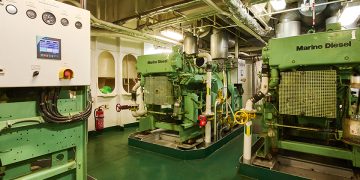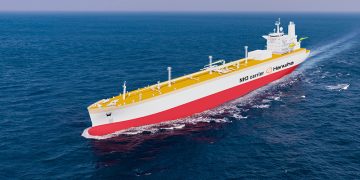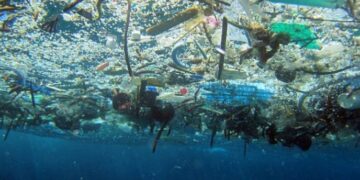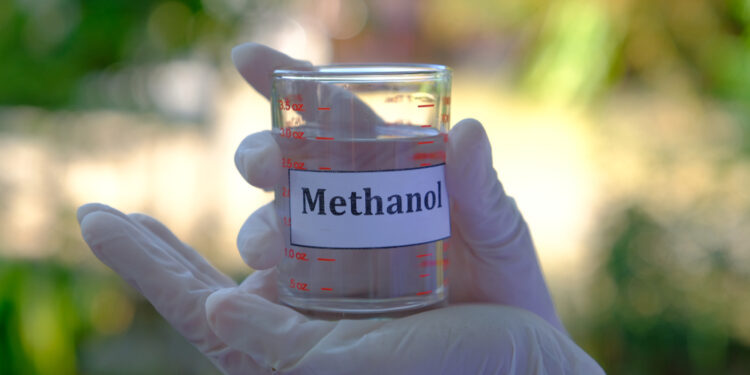This March, Naturschutzbund Deutschland (NABU) NGO released a study on methanol as a marine fuel focusing on its advantages and disadvantages and highlighting that it is significantly less harmful to the environment and can be used more straightforwardly than ammonia or hydrogen – let alone heavy fuel oil.
Methanol can be an important building block in the transition to more climate-friendly shipping. To be climate neutral, e-methanol must be produced using renewable energy and a sustainable source of CO2. Biomethanol or e-methanol with carbon sourced from biomass are not applicable solutions on a larger scale.
Methanol advantages:
- E-methanol offers many advantages compared to fossil fuels such as diesel, heavy fuel oil and LNG but also to e-ammonia.
- In the event of a leak, methanol dissolves very quickly in water.
- Vapors released into the air are also dispersed quickly.
- There are already safety guidelines for methanol in shipping in place, as well as empirical data from ships already operating on methanol.
- The risks to marine ecosystems are manageable and significantly lower compared to today’s fuels or ammonia.
- Above all, risks are much lower than with toxic heavy fuel oil that is used on many ships today and frequently leads to the contamination of entire regions.
It is high time turning the tide. Technical solutions are important. But it is even more important that the political course is now set so that these technologies finally sweep fossil fuels out of the race. Last chance for shipping to meet the Paris climate goals.
…said Leif Miller, NABU CEO.
Methanol Production
The production of e-methanol consists of several steps and is based on the availability of green hydrogen produced from renewable energy and water through water electrolysis. Given the need for more renewable energy capacities and their limitation today, green hydrogen production necessitates additional renewable electricity generation. The climate impact of e-methanol is mainly determined by the use of renewable energy throughout the whole production process and by the source of CO2 used as input to the production of the fuel.
In 2022, the production of methanol via alternative production pathways (i.e. bio-methanol from residual biomass or e-methanol) was very limited. Its future availability will depend upon the level of investment in new capacity to ramp up production. It is estimated that methanol will enter the markets around 2024-25
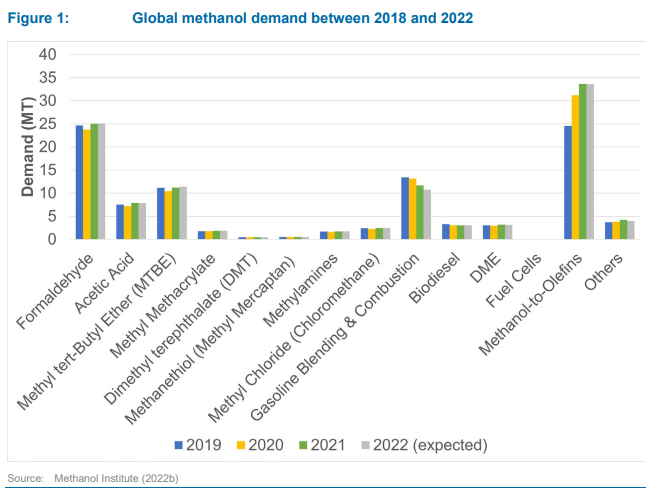
Methanol in the shipping sector
Methanol (CH3OH) is liquid at ambient temperatures, less energy dense than conventional fossil fuels (like MGO), but more energy dense than ammonia or hydrogen. Based on the energy density, tanks onboard a vessel would hence be larger for methanol than MGO tanks but similar in size to liquefied natural gas (LNG) tanks. Methanol tanks can be installed in areas of the ship (e.g. at the bottom) where other fuel tanks, such as ammonia and LNG, could not be installed due to their more complicated fuel characteristics (like pressure and toxicity).
As a result, the overall space consumption for methanol on board is a little less compared to LNG and ammonia. According to engine manufacturers (Wärtsilä 2022), tanks for methanol will (depending on the ship design) only be 1.6 times larger than for MGO.
Due to the larger tank size, there can be a trade-off between the cargo carrying capacity and the refuelling pattern when using methanol as a marine fuel. If the cargo-carrying capacity is maintained, a methanol-fuelled fleet could maintain 93 % of the current cargo (bulk) operations. Experts from the industry thus confirm that a loss in cargo-carrying capacity of ships running on methanol is expected, but that there is enough bunkering space onboard to maintain today’s trade route or operating range.
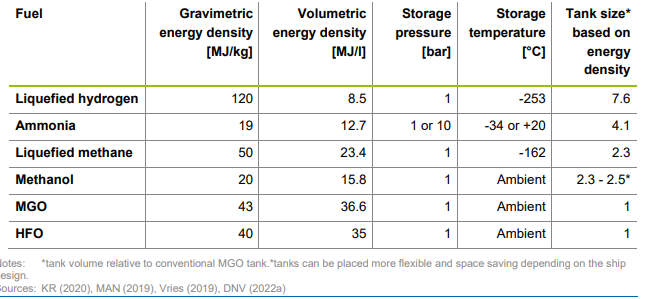
Methanol port storage
The available bunkering option for methanol will vary depending on the port and the amount of fuel demanded. Initially, new fuels will likely be delivered truck-to-ship or ship-to-ship. Although the properties of methanol (i.e. such as its flammability, toxicity and corrosivity) present risks for the bunkering of the fuel, ports already have a lot of experience in safely handling methanol and the fuel is available in over 100 ports globally.
In total, the research identified a total methanol storage capacity at ports of approx. 25 Mt. Iran, the Netherlands, China, Saudi Arabia and Belgium collectively account for 60 % of the global methanol storage capacity at ports identified. It should be added that the storage capacity for methanol represents a potential and this will only be made available in practice if there is sufficient demand in the future for methanol as a marine fuel. It is expected that existing infrastructure for petroleum products (like HFO) could be converted to methanol storage and distribution with only minor modifications that would further increase capacity.
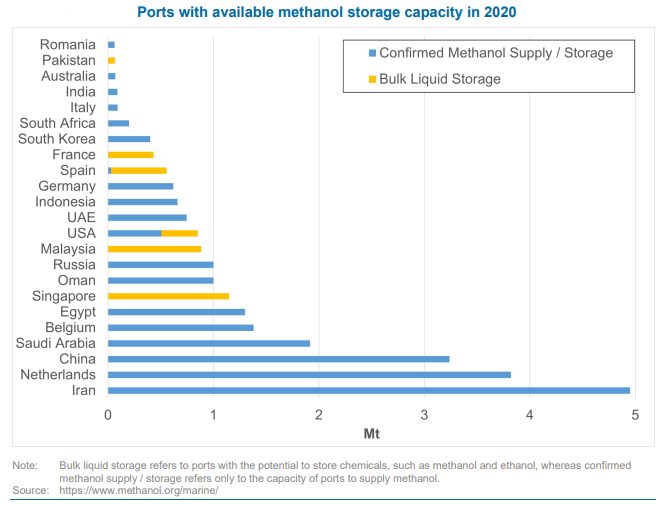
Sönke Diesener, NABU shipping expert: “Green methanol is a climate- and at the same time environmentally friendly fuel. However, a huge volumes of renewable electricity is required to produce the necessary quantity. But in shipping, unlike other industries, there is no way around e-fuels.”
To bring e-fuels to market as quickly as possible, the international requirements for limiting the climate impact in shipping must be adapted promptly and price differences compared with fossil fuels, for example via a CO2 price, must be compensated for as quickly as possible. International Maritime Organization (IMO) must not miss this year’s chance to adopt climate neutrality by 2050 and advance an effective pricing of greenhouse gas emissions.
…Sönke Diesener added.
Toxicity for humans and marine environment
Methanol is easily absorbed by inhalation, ingestion or skin contact and it is rapidly distributed in the body. It is highly flammable und acutely toxic to humans and mammals. Methanol poisoning can cause irreversible damage to nerves, especially the typical damage to the optic nerve caused by
methanol can lead to blindness.
However, methanol is unlikely to be ingested in the normal handling of a fuel, so this risk of poisoning is considered to be very low. In contrast to the toxicity to humans, methanol is less toxic to aquatic organisms (fish, invertebrates, algae and microorganisms).
If methanol is spilled into sea water most of it will disperse rapidly in the water because of the high solubility. Depending on the temperature some of the methanol will form a vapor phase above the water, which is also dispersed quickly. It is fully biodegradable with no potential to bioaccumulate. This makes methanol the fuel with the lowest toxicity and the lowest hazard compared to diesel, heavy fuel oil or ammonia.
Important findings
- The future fuel mix in all segments of shipping will become more diverse depending on the application.
- With appropriate production, e-methanol will make an important contribution to this, above all from a nature conservation perspective, but also from a climate perspective.
- In addition to internal combustion engines, fuel cells and batteries will become increasingly important.
- To fundamentally reduce energy requirements, however, ships must above all become more efficient and make use alternatives such as wind propulsion.
- Ultimately, the demand for energy must also be reduced through lower transportation requirements.







